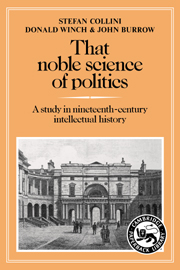Book contents
- Frontmatter
- Contents
- Preface
- PROLOGUE: The governing science: things political and the intellectual historian
- I The system of the North: Dugald Stewart and his pupils
- II Higher maxims: happiness versus wealth in Malthus and Ricardo
- III The cause of good government: Philosophic Whigs versus Philosophic Radicals
- IV The tendencies of things: John Stuart Mill and the philosophic method
- V Sense and circumstances: Bagehot and the nature of political understanding
- VI All that glitters: political science and the lessons of history
- VII The clue to the maze: the appeal of the Comparative Method
- VIII Particular polities: political economy and the historical method
- IX The ordinary experience of civilised life: Sidgwick and the method of reflective analysis
- X A separate science: polity and society in Marshall's economics
- XI A place in the syllabus: political science at Cambridge
- EPILOGUE: A nebulous province: the science of politics in the early twentieth century
- Index
III - The cause of good government: Philosophic Whigs versus Philosophic Radicals
Published online by Cambridge University Press: 17 September 2009
- Frontmatter
- Contents
- Preface
- PROLOGUE: The governing science: things political and the intellectual historian
- I The system of the North: Dugald Stewart and his pupils
- II Higher maxims: happiness versus wealth in Malthus and Ricardo
- III The cause of good government: Philosophic Whigs versus Philosophic Radicals
- IV The tendencies of things: John Stuart Mill and the philosophic method
- V Sense and circumstances: Bagehot and the nature of political understanding
- VI All that glitters: political science and the lessons of history
- VII The clue to the maze: the appeal of the Comparative Method
- VIII Particular polities: political economy and the historical method
- IX The ordinary experience of civilised life: Sidgwick and the method of reflective analysis
- X A separate science: polity and society in Marshall's economics
- XI A place in the syllabus: political science at Cambridge
- EPILOGUE: A nebulous province: the science of politics in the early twentieth century
- Index
Summary
A philosophic Whig is firm to the popular principle of our government, and consequently firm against any encroachment, whether from the monarchical or democratical side.
henry cockburn, Life of Lord Jeffrey (1852)Those whom … we call philosophic radicals, are those who in politics observe the practice of philosophers – that is, who, when they are discussing means, begin by considering the end, and when they desire to produce effects, think of causes.
john stuart mill, ‘England under Seven Administrators’, Westminster Review (1837)although the definitions offered here by Cockburn and Mill amount to little more than slogans, they signal an interesting divergence between the two groups who were most anxious to claim philosophical standing for their political diagnoses in the years leading up to, and immediately following, the Reform Act of 1832. Cockburn spoke for that generation of largely Scottish-educated Whigs which figured prominently in the first of these essays; while Mill spoke for a new wave, those younger followers of Bentham's Utilitarianism who took their cue from James Mill, regarded the Essay on Government as ‘a masterpiece of political wisdom’, and adopted ‘enmity to the Aristocratical principle’ in government as their motto. Rivalry, challenge, and supersession have frequently been taken to be the keynotes of the relationship between philosophic Whigs and Radicals in this period, with the narrower, harder-nosed, ‘English’ doctrines of the Utilitarians eventually emerging victorious over their more generous ‘Scottish’ counterparts.
- Type
- Chapter
- Information
- That Noble Science of PoliticsA Study in Nineteenth-Century Intellectual History, pp. 91 - 126Publisher: Cambridge University PressPrint publication year: 1983



